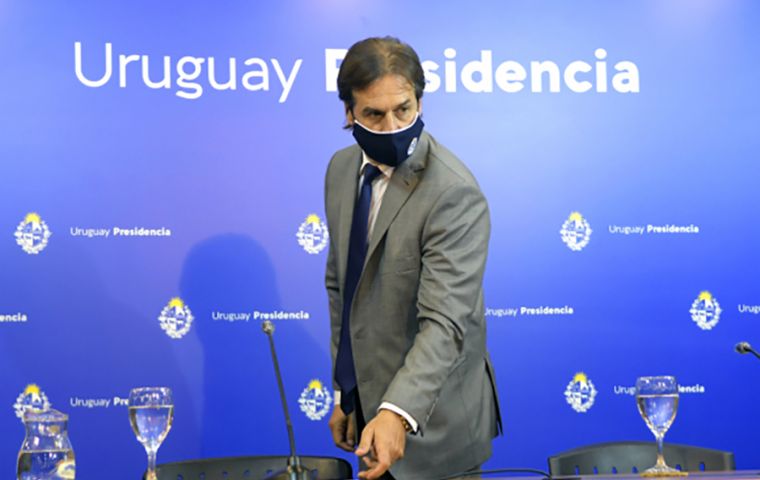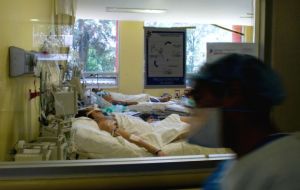MercoPress. South Atlantic News Agency
Uruguayan government to debate measures amid record Covid-19 cases and political pressures
 President Luis Lacalle Pou called this Tuesday to an extraordinary meeting of the Council of Ministers to evaluate new measures to stop the exponential growth of coronavirus cases
President Luis Lacalle Pou called this Tuesday to an extraordinary meeting of the Council of Ministers to evaluate new measures to stop the exponential growth of coronavirus cases  There are 14,418 active cases and 188 hospitalized in intensive care, around 24% of the average capacity of the health system.
There are 14,418 active cases and 188 hospitalized in intensive care, around 24% of the average capacity of the health system. The Uruguayan government will discuss this Tuesday a radical reduction of mobility in the midst of a new wave of Covid-19 cases. This Monday, the highest number of new cases was detected, with almost 2,700 confirmed cases and a positivity rate of 18%, and the community spread of the Brazillian P-1 variant of the virus was confirmed.
After the publication of the daily report of the National Emergency System (SINAE) and the report of the Ministry of Public Health (MSP) together with the University of the Republic and private laboratories confirming the community spread of the new variant, known to be more contagious -although not more deadly-, President Luis Lacalle Pou called this Tuesday to an extraordinary meeting of the Council of Ministers to evaluate new measures to stop the exponential growth of coronavirus cases in the country, mainly affecting the capital, Montevideo, and Rivera, a state bordering Brazil.
The call was decided in the context of a resurgence of the first wave dating back to January, which coincides with the start of vaccination on March 1, and the different variants that mark a greater epidemiological risk not experienced in Uruguay since the beginning of the pandemic.
The government is facing gloomy forecasts and demands from scientific, academic, and political groups to impose greater restrictions on mobility, measures such as a lockdown that were not applied in Uruguay since the beginning of the pandemic, unlike in neighboring countries.
The government's plan to deal with the advance of the virus had to be adjusted in the last week due to the increase in cases and the consequent stress on the health system, which still maintains a “moderate” response capacity - the medium level - but with the risk of moving “rapidly” to a “compromised” situation, according to the report released by the Executive's Honorary Scientific Advisory Group (GACH).
On March 1, Uruguay started its vaccination plan with the Coronavac doses - and days later those from Pfizer - arrived in the South American country, which has already been administered to 336,558 people, almost one out of every ten inhabitants, as of 17:30 this Monday.
The Minister of Health, Daniel Salinas, said that this news could lead the government to “change directions” regarding the measures applied so far to control the pandemic. “When the situation changes and we have elements that science provides us with, that can lead us to change course,” said the minister at a joint press conference held by the MSP, the University of the Republic, and the Pasteur Institute of Montevideo on Monday afternoon to disseminate the findings.
Between the “threat” posed by the new variant - registered in “at least seven states”, according to the authorities - and the increase in daily cases, members of the ministerial cabinet and legislators of the coalition of parties that governs the country agree that it is “inevitable” to tighten the screws to lower the cases and face vaccination with a little more oxygen. The 2,682 new cases occurred in a total of 14,952 tests -18% positive- and there were 19 deaths. There are 14,418 active cases and 188 hospitalized in intensive care, around 24% of the average capacity of the health system.
Gonzalo Moratorio, member of the Interinstitutional Working Group (GTI) which monitors the advance of the SARS-CoV2, informed that the appearance of the new Brazilian variant “is beginning to contribute” to the notorious increase in cases, but that “more studies are needed” to determine this. Minister Salinas was questioned about the possible saturation of the CTI in the country.
The Minister said that in the cabinet “they are not prone” to stand still and that the measures to be taken are going to be part of the announcements to be made this Tuesday. “No measures have been ruled out,” he said.




Top Comments
Disclaimer & comment rulesCommenting for this story is now closed.
If you have a Facebook account, become a fan and comment on our Facebook Page!